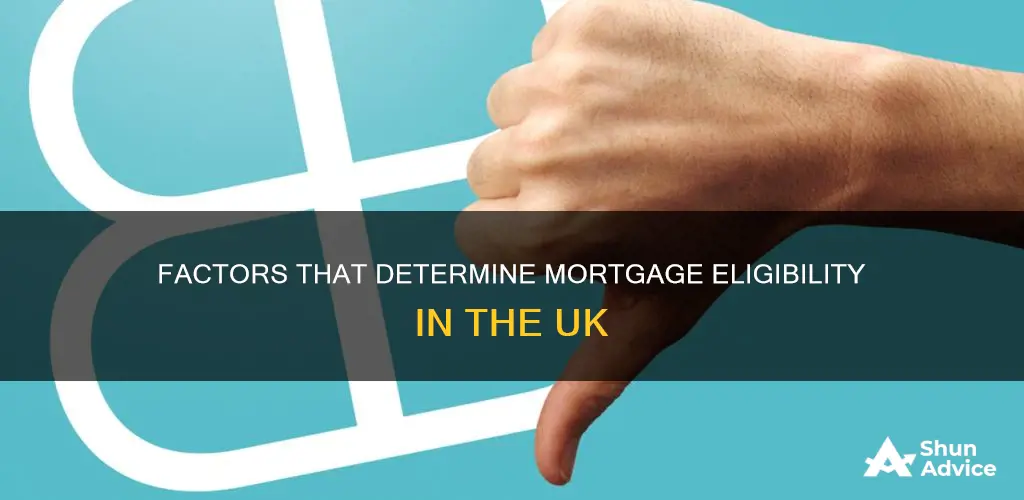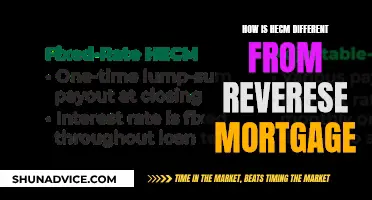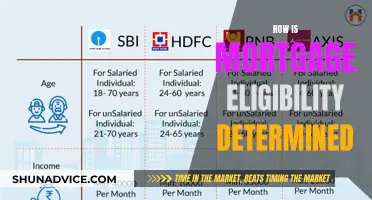
When buying a property, you will likely need to take out a loan, known as a mortgage. A mortgage is a loan taken out to buy property or land, which you repay to the lender with interest by making monthly payments over an agreed timeframe. The interest rate on a loan is affected by two main components: the bank rate and the lender's margin. However, several personal and market factors determine how mortgage rates are determined, including credit history, income, down payment, inflation, and bond yield fluctuations. Mortgage rates vary based on the economy's performance and outlook. When the economy is doing well, mortgage rates tend to increase, whereas when the economy is slowing down, interest rates decrease.
| Characteristics | Values |
|---|---|
| Type of loan | Mortgage |
| Purpose | To buy property or land |
| Duration | 2-40 years |
| Down payment | 5% of the property purchase price as a deposit |
| Interest rate | Depends on personal and market factors such as credit history, income, down payment, inflation, and bond yield fluctuations |
| Adjustable-rate mortgages (ARMs) | Interest rates can change as often as once a year |
| Fixed-rate mortgages | Interest rates stay the same throughout the loan period |
| Annual Percentage Rate of Charge (APRC) | The total cost, including commissions and fees |
| Secured Overnight Financing Rate (SOFR) | An interest rate set based on the cost of overnight borrowing for banks |
| Constant Maturity Treasury rates (CMT) | A yield that's calculated by taking the average yield of different types of US Treasury securities with varying maturity periods |
What You'll Learn

Interest rates
On the personal side, lenders will look at your credit score, income, debt-to-income (DTI) ratio, assets, and other financial information to determine your risk level. The bigger the deposit, the smaller your loan-to-value ratio (LTV) will be, and the lower the mortgage rate you will generally be offered. A larger down payment also lowers your monthly mortgage payment. Lenders will also consider your spending habits and whether you are repaying debts on time.
On the market side, interest rates are impacted by the bank rate, the lender's margin, and the state of the economy. The bank rate, or reference rate, is the interest rate on loans that financial institutions make to each other, such as transactions between the Bank of England and commercial banks. The lender's margin is the other component that affects the interest rate on a loan, or APR. The Secured Overnight Financing Rate (SOFR) is an interest rate set based on the cost of overnight borrowing for banks, and lenders often use it to determine a mortgage's base interest rate. When the economy is doing well, meaning low unemployment and high spending, mortgage rates tend to increase. Conversely, when the economy is slowing down, interest rates tend to decrease.
Mortgage interest rates can be either fixed or adjustable. With a fixed-rate mortgage, the interest rate stays the same throughout the life of the loan, while with an adjustable-rate mortgage (ARM), the interest rate can change over time, typically increasing. The term of the loan also impacts the interest rate, with longer-term mortgages having lower monthly payments but resulting in a higher overall purchase cost due to the interest accruing over a longer period.
Mortgages and Promissory Notes: What's the Real Difference?
You may want to see also

Credit score
A person's credit score is one of the most important factors in determining whether they will be approved for a mortgage in the UK. Lenders use this to assess how likely an applicant is to repay their loan on time. A higher credit score indicates a lower risk to the lender, which can increase the chances of mortgage approval and may also lead to
Retirement Savings: Mortgage Application Considerations for Your 401k
You may want to see also

Down payments
A down payment, or deposit, is the lump sum you pay upfront when applying for a mortgage to buy a property. In the UK, a deposit of 5% is usually the minimum needed to get a mortgage, but saving a larger deposit can help you secure a lower mortgage rate. For example, when we checked in April 2024, 90% mortgages were generally around 0.3 to 0.4 percentage points cheaper than 95% deals.
The amount of deposit you pay will be the equity you own outright in the property when you buy it. The mortgage you're taking out will then cover the rest of the cost of the property. This is known as your loan-to-value (LTV) ratio. So, if you have a £5,000 deposit and are looking at a property worth £100,000, you need a mortgage of £95,000 and are borrowing at 95% LTV. Importantly, mortgage rates tend to be lower, the lower the LTV. There'll be more mortgage deals to choose from too, and having a higher deposit can help lower your LTV.
The larger your deposit, the smaller your loan will be, and the cheaper your monthly repayments. A larger deposit will also make you less risky for mortgage lenders, so they'll generally offer you lower interest rates. Your improved LTV ratio will also improve your chances of passing the affordability tests carried out by lenders when deciding whether to offer you a mortgage.
If you're finding it difficult to save for a deposit, there are a few alternative options. For example, you could take out a 100% mortgage, where you borrow the entire value of the home you're buying. However, there are only a few no-deposit mortgages available, and you'll usually need a family member or close friend to act as a guarantor and agree to cover your repayments if you can't. With the Shared Ownership scheme, you buy a percentage of a property (usually 25%) and pay rent on the remainder. The deposit you need will be 5% to 10% of the share you're buying, rather than the full value of the property. The Right to Buy scheme gives many council tenants the opportunity to buy the property where they live at a discount of up to 70% off the purchase price, up to a total of £116,200 in London and £87,200 elsewhere in England.
It's worth noting that home loans with a low down payment typically involve mortgage insurance or a funding fee. While FHA loans will always have mortgage insurance, and VA loans will have a funding fee, putting at least 20% down usually waives the requirement for mortgage insurance. Additionally, if you're buying a custom home, where you finance the purchase of land and hire a builder, lenders will generally require a larger down payment since the house doesn't exist yet.
Mortgage Borrowing: When Is It Too Much?
You may want to see also

Inflation
On the other hand, inflation can benefit borrowers by reducing the real inflation-adjusted value of their mortgages. For example, a £200,000 mortgage in 2021 would have decreased in value to £168,000 in 2023 due to inflation, even without any capital repayments. Over time, inflation can make households more solvent, as their mortgage liabilities become relatively smaller compared to their income.
For those with fixed-rate mortgages, monthly payments remain unchanged until the end of the fixed term. However, once the fixed term expires, borrowers may be moved to their lender's standard variable rate, which fluctuates with market changes, or they may opt for a new fixed-rate deal.
While inflation can have both positive and negative effects on mortgages, it is essential to consider other economic factors and individual circumstances when assessing the overall impact.
The Cost of Borrowing: $2 on a $400,000 Mortgage
You may want to see also

Loan types
There are several types of loans available in the UK, each with its own set of benefits and drawbacks. Here are some of the most common types:
Fixed-Rate Mortgages
The most common type of mortgage, fixed-rate mortgages offer stability and consistency. The interest rate is locked in for a specific period, typically ranging from two to ten years, and remains unchanged during that time. This means your monthly repayments will be the same, regardless of any changes in the Bank of England base rate. While this provides certainty and makes budgeting easier, it also comes with a penalty if you decide to switch mortgages or pay off your loan early.
Variable-Rate Mortgages
Variable-rate mortgages, also known as standard variable rate (SRV) or tracker mortgages, differ from fixed-rate mortgages in that the interest rate can fluctuate. The rate is influenced by the financial market and the Bank of England base rate, and it can rise or fall during the loan term. This type of mortgage may be more unpredictable but can offer opportunities for savings when the interest rate is low.
Repayment Mortgages
With a repayment mortgage, you gradually pay back both the capital and the interest over time. This is the most common type of mortgage structure and is available as both fixed-rate and variable-rate options. The goal is to repay the entire loan amount, including interest, by the end of the term, allowing you to build equity and eventually own your home outright.
Interest-Only Mortgages
Interest-only mortgages are an alternative to repayment mortgages. With this type of loan, you only pay the interest each month, and the principal amount remains unchanged. This results in lower monthly payments but requires a robust plan to repay the full loan amount at the end of the term. Interest-only mortgages may be suitable for those who expect a significant future income rise or have a reliable repayment strategy in place.
Offset Mortgages
Offset mortgages allow you to link your savings to your mortgage, reducing the amount of interest charged. The value of your savings is offset against the amount you borrowed, resulting in lower interest payments. This can be beneficial if you have substantial savings, as it reduces the overall cost of your mortgage. However, you won't be able to earn interest on your savings during this period.
95% Mortgages
95% mortgages are designed for those who may struggle to save for a larger deposit. With this type of loan, you can borrow 95% of the property value, contributing only a 5% deposit. However, due to the higher risk, lenders typically charge a much higher interest rate, and it can be challenging to build equity in your home with this type of mortgage.
Creating Mortgage-Backed Securities: A Step-by-Step Guide
You may want to see also
Frequently asked questions
A mortgage is a loan taken out to buy property or land. The loan is 'secured' against the value of the home until it is paid off.
Mortgage rates vary based on how the economy is doing and its outlook. When the economy is doing well, mortgage rates increase. When the economy is slowing down, interest rates decrease. Mortgage rates are also influenced by personal factors such as credit history, income, down payment, and debt-to-income ratio.
Mortgage interest is calculated as a percentage of the remaining principal. With most mortgages, you pay back a portion of the amount you borrowed (the principal) plus interest every month. The longer the term, the lower your monthly payments will be.
The most you can borrow is usually capped at four-and-a-half times your annual income. Lenders will also look at your income and outgoings to check if you could keep up with repayments if things change, like an interest rate rise or if your income changes.







